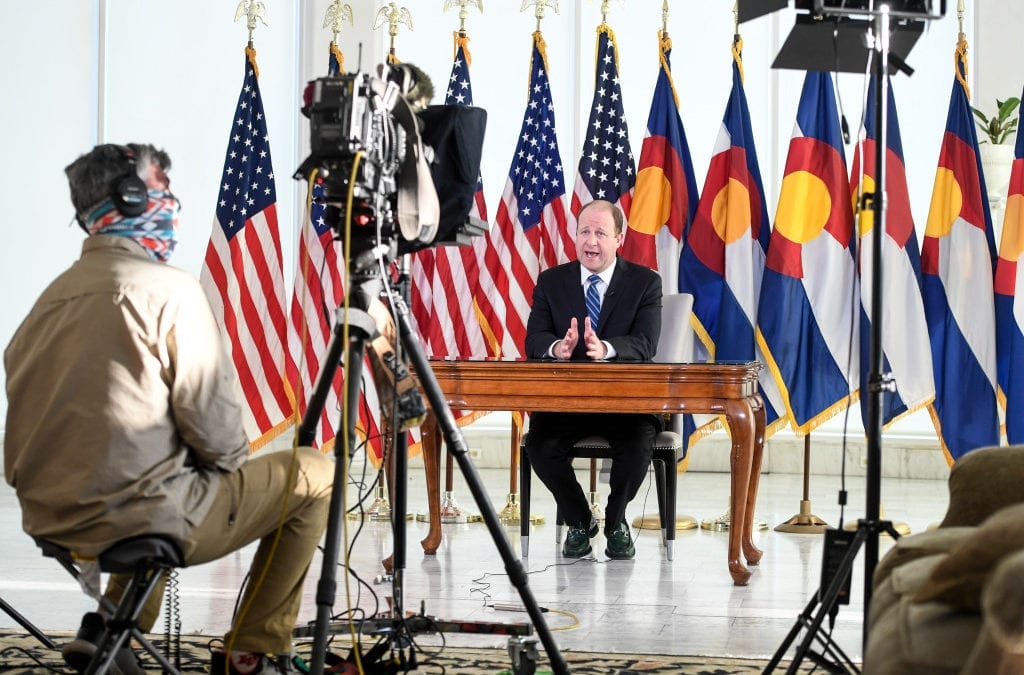In a special address to the state Monday evening, Colorado Gov. Jared Polis said he is extending the statewide stay-at-home order, set to expire Saturday, until at least April 26.
“If there is any way to safely end it sooner, then we will,” Polis said. “And likewise if Coloradans aren’t staying at home and the numbers of the dead and dying continue to increase, then it could go longer.”
The governor struck a hopeful tone in his 19-minute speech but emphasized, as he has for weeks, how important it is for Coloradans to obey the state stay-at-home order.
“The sheer size of this crisis has forced us to take a series of drastic measures that we would have thought unthinkable, unimaginable just a month ago,” Polis said, later adding, “By staying home, wearing a mask when you go out, practicing proper physical distancing and proper hygiene — you are literally saving lives.”
Like so much else since March 5, when Polis announced the state’s first known cases of the virus, the address was unprecedented. It’s the first time Polis has requested TV and radio stations give him time to speak directly to the public since he took office in January 2019.
As of the governor’s address, Colorado has counted a total of 5,172 known cases of the coronavirus, 994 hospitalizations and 150 deaths. Because of a lack of testing, experts say, Colorado’s known case count is dramatically short of reality.
An estimated 17,000 to 18,000 Coloradans have the virus or have had it, public health officials said in a call with reporters several hours before the governor’s address. The officials also estimated that 30%-40% of Coloradans will catch the virus in the coming months, and that 5% of those people will require hospitalization.
Polis has declined up to this point to guess when the number of new coronavirus cases in Colorado will peak and offered no specifics Monday.
“We all want a timeline,” he said. “When will this nightmare be over?”
The peak of hospitalizations, he has said, will likely come a week or two after the case peak, and officials and health care providers are working feverishly to avoid a scenario in which the health care system in the state is overwhelmed and unable to effectively treat all patients in need.
On the earlier press call, state health officials reiterated what Polis has been saying for weeks: The date and severity of the peak depend on how seriously the state takes social distancing.
Denverites have already been assured their activities will be restricted through at least the end of the month. Mayor Michael Hancock made that official Monday afternoon, extending Denver’s stay-at-home order until April 30 prior to the governor’s address.
Polis spoke Monday of the heartache he feels over the economic decline the virus, by way of shutdown orders, has wrought. More than 4% of the state’s labor force has filed for unemployment in the last three weeks. But the cost of not closing down nonessential activities would be higher, he said.
“If the choice is between a temporary shutdown and a catastrophic loss of life, the choice is clear,” the governor said. “These closures and restrictions will be temporary. But when you lose a life, you lose it forever.
“And in fact, the economic consequences will be even more severe and more prolonged if we completely overload our hospitals. The longer this economic paralysis lasts, the fewer jobs there will be to return to, and the more difficult the recovery will be.”
He obliquely criticized the federal response to the pandemic.
“Like many of you,” he told viewers, “I am beyond furious that we have been forced to shut down large portions of our economy — putting tens of thousands out of a job — because the wealthiest nation on the face of the earth doesn’t have the supplies and testing that we need to mount a proper, more targeted response.”
Polis encouraged people to socialize and support one another to the extent possible — on video calls, by joining in communal howls at 8 p.m. — and asked for patience.
“There will be a day in the not-too-distant future that we can be together once again,” he said. “When we can go to bars and restaurants, attend schools and universities, churches and temples. When grandparents can hug their grandchildren without fear of getting sick. When we can once again feel the wind against our face as we ski down our favorite ski runs and hike our favorite trails.
“But that day is not today. Nor is it tomorrow.”
This content was originally published here.

